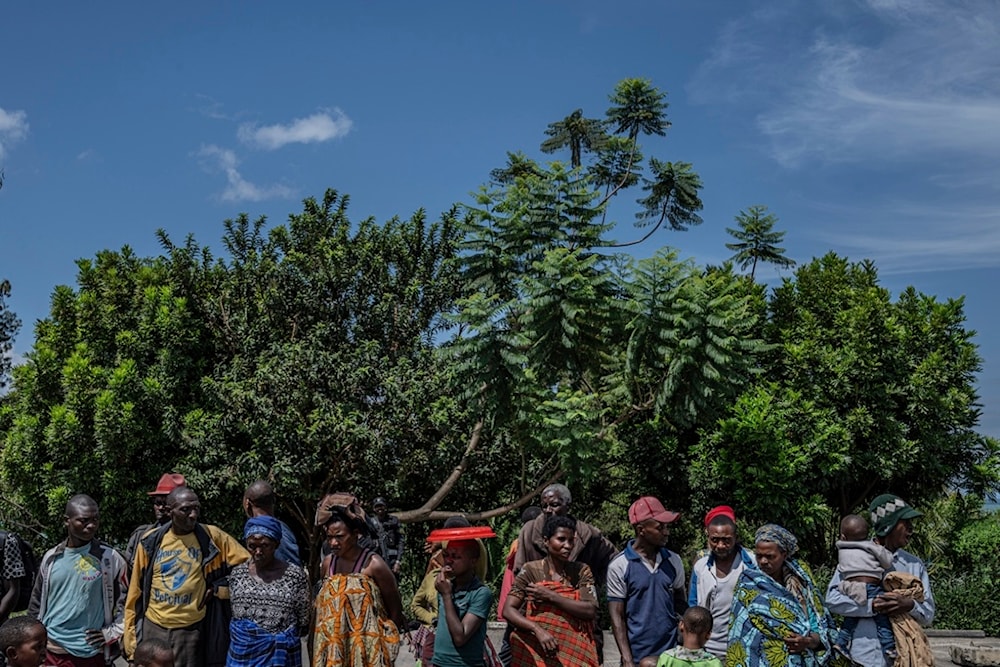Rwanda exits Central African bloc over Congo dispute
Rwanda quits ECCAS after being denied chairmanship, accusing Congo of politicizing the bloc amid tensions over Rwanda-backed M23 rebel activity in eastern Congo.
-

Rwandan refugees who were living in eastern Congo since the 1994 Rwanda genocide wait for repatriation from Goma, Democratic Republic of the Congo, on Saturday, May 17, 2025 .(AP)
Rwanda has announced its withdrawal from the Economic Community of Central African States (ECCAS) as part of the escalation in regional diplomatic tensions tied to ongoing violence in eastern Congo.
The move came after the 11-member regional bloc declined to transfer its rotating chairmanship to Rwanda during a meeting Saturday in Equatorial Guinea, opting instead to extend Equatorial Guinea’s term. Kigali’s Foreign Ministry condemned the decision as a breach of ECCAS’s founding principles and accused the bloc of being politically manipulated by the Democratic Republic of the Congo (DRC).
“There is no justification for remaining in an organization whose current functioning runs counter to its founding principles,” Rwanda said in a formal statement, citing what it called the DRC's "instrumentalization" of ECCAS.
It remains unclear whether Rwanda’s withdrawal takes immediate effect or whether further procedures are required to finalize its exit.
The rupture comes as M23 rebels, widely reported to be backed by Rwanda, continue to mount a major offensive in eastern Congo. Earlier this year, the group seized two of the region’s largest cities, leaving thousands dead and triggering fears of a broader regional conflict.
The government of Congolese President Felix Tshisekedi welcomed ECCAS’s decision to sideline Rwanda, saying in a statement that member states had “acknowledged the aggression against the Democratic Republic of Congo by Rwanda and ordered the aggressor country to withdraw its troops from Congolese soil.”
The M23 conflict has drawn widespread condemnation, with the United Nations and multiple governments accusing Rwanda of arming and supporting the rebel movement. Kigali has consistently denied the allegations, claiming that its forces were acting in self-defense against Congolese army units and ethnic Hutu militias linked to perpetrators of the 1994 Rwandan genocide.
Global stakes and peace efforts
The crisis in eastern Congo has attracted international mediation efforts. The African Union, the United States, and Qatar are all involved in trying to broker a ceasefire between Kinshasa and Kigali.
The region is not only a geopolitical flashpoint but also a critical supplier of strategic minerals, including cobalt, tantalum, copper, and lithium, used in electronics and clean energy technologies.
The administration of US President Donald Trump has reportedly engaged in quiet diplomacy to secure a peace accord between Rwanda and Congo. Such a deal, officials say, could pave the way for billions in Western investment into the mineral-rich Great Lakes region.
ECCAS was established in the early 1980s to promote regional cooperation on issues ranging from security to economic development. But critics say the bloc has struggled to respond effectively to cross-border crises, including the long-running instability in eastern Congo.
Rwanda’s withdrawal highlights the fragility of regional alliances in Central Africa and underscores the limits of multilateral institutions when confronted with entrenched conflict and competing national interests.
Amnesty warns of war crimes
Last week, Amnesty International released a report accusing M23 of committing war crimes in eastern Democratic Republic of Congo (DRC), including unlawful killings, torture, enforced disappearances, and the taking of civilians as hostages.
“M23’s public statements about bringing order to eastern DRC mask their horrific treatment of detainees. They brutally punish those who they believe oppose them and intimidate others, so no one dares to challenge them,” said Tigere Chagutah, Amnesty International’s Regional Director for East and Southern Africa.
Between February and April 2025, Amnesty International interviewed 18 male civilians who had been held in M23 detention sites. Nine of them reported being tortured, while others described witnessing fellow detainees die as a result of beatings and deprivation.
Detainees reported being held in overcrowded, unsanitary cells without adequate food, water, or medical care. Many were denied contact with their families and held incommunicado.
One former detainee said he saw a man executed after being accused of hiding weapons. Others recounted how detainees were beaten with wooden rods, cables, and metal objects. At least two detainees described witnessing fellow prisoners being killed with hammers.
All 18 former detainees said they either experienced or witnessed torture. Beatings were routine, often carried out using electric cables, engine belts, and sticks. Victims were struck on their backs, legs, buttocks, and genitals, leaving lasting injuries. Amnesty International reviewed photos consistent with accounts of torture and confirmed several cases of hospitalization.

 4 Min Read
4 Min Read








